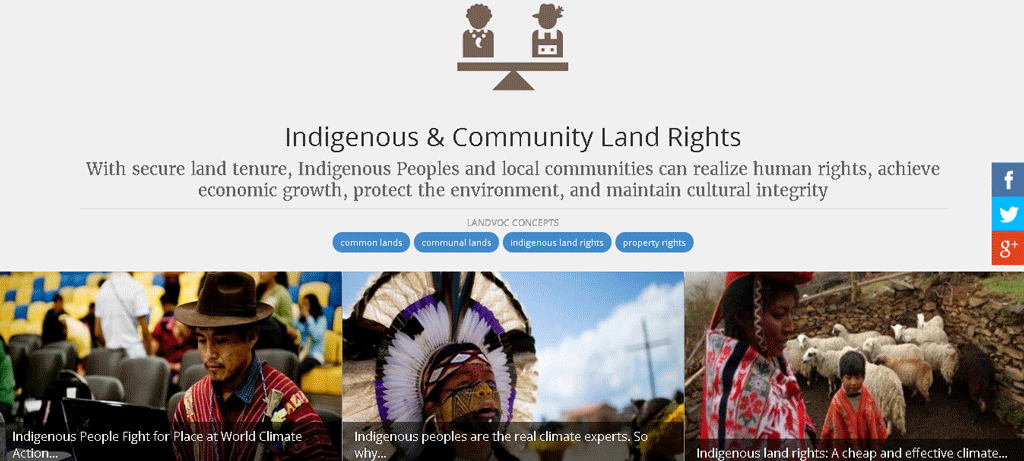By Nicholas Tagliarino, Land Portal Foundation
Looking for easy access to online information, data, news, and other materials on land? Want to learn more about indigenous and community land rights, women’s land rights, and forest tenure? Tired of information on land being inaccessible or scattered across various websites and databases? Land Portal now serves your needs.
Today, Land Portal launched three new Land Book thematic portfolios: Indigenous & Community Land Rights, Forest Tenure, and Land & Gender. These portfolios enable users to easily access and utilize a broad range of relevant data, primary and secondary literature, news articles, online discussions, and events. These portfolios provide users with a better alternative to sifting through countless search results on Google, many of which may be unrelated to the topic of interest. By linking and categorizing a wealth of land-related information, Land Portal’s new thematic portfolios are a “one-stop shop” for researchers, activists, journalists, civil societies, and other stakeholders engaged in land governance issues.
Indigenous & Community Land Rights,
Take the Indigenous and Community Land Rights thematic portfolio. On this portfolio, users can view a comprehensive summary — written by Land Portal and the Rights and Resources Initiative (RRI) — of the main issues related to community land rights, including information on international and national protection of such rights. The thematic portfolio also provides an overview of current issues and agendas on strengthening indigenous and community land rights, such as information on the Land Rights Now campaign, which aims at doubling the global amount of formally recognized indigenous and community land by 2020. Another section of the portfolio focuses on current research relating to the connections between community tenure and climate change mitigation.
Further down on the Indigenous & Community Land Rights portfolio, users can access relevant publications, news articles, information on Land Portal partners working in the field, events, blogs, debates, and tenure data published by RRI and the World Bank. For example, RRI’s forest tenure data is shown on a map, which, among other features, allows users to compare the percentage of formally recognized indigenous and community forests across 46 countries. The Indigenous & Community Land Rights portfolio also ranks countries based on whether governments are currently recognizing and protecting indigenous and community land rights in practice. By default, this ranking is based on the results of the World Bank’s Land Governance Assessment Framework, but it allows for the selection of a wide range of indicators. Soon, this thematic portfolio will also show LandMark’s legal indicator data on the tenure security of indigenous and community lands.
The Land & Gender thematic portfolio links open data and information on women’s land rights and includes a compelling narrative written by Landesa, one of the world’s leading NGOs working to secure women’s land rights around the world. The narrative provides an in-depth summary of current issues relating to women’s land rights, including the global number of women landholders, how current laws and customary practices are gender discriminatory, and the role of women in the context of community land use, management, and decision-making. The narrative also discusses the gender impacts of climate change as well as the ripple effects that strengthening women’s land rights has on poverty reduction, food security, economic growth, and other sustainable development objectives. The Land & Gender portfolio also provides gender-focused tenure data published by FAO, OECD Development Centre, and the World Bank. As with the other thematic portfolios, the Land & Gender portfolio allows users to compare and analyze this data across a broad range of countries. For example, users can use the ranking tool on this portfolio to see which countries currently provide women and men with equal access to land and which countries do not.
Forest Tenure
The Forest Tenure thematic portfolio contains a wealth of information on forest tenure and governance issues. At the top of the portfolio, users are presented with a captivating narrative written by forestry experts at the Center for International Forestry Research (CIFOR). Through the Forest Tenure portfolio, users can learn about current forest tenure reforms, the connections between secure forest tenure and climate change mitigation, forest tenure as recognized in international agreements, and gender disparities within community forestry systems. On this portfolio, users can also access RRI’s indicator data on forest tenure, the World Bank’s Land Governance Assessment Framework data on forest commons, the Land Matrix’s data on large-scale forest land acquisitions, and other related sources, news articles, and events.
An Ongoing Collaboration
The development of Land Portal’s thematic portfolios is an ongoing, collaborative effort, involving contributions from a diverse range of research organizations, civil societies, and other stakeholders. In the coming weeks, for instance, Land Portal plans to post narratives on a new Urban Tenure thematic portfolio (written by Habitat for Humanity) and a new Land Investments thematic portfolio. In the future, Land Portal will continue to populate its thematic portfolios as new information becomes available.
Through enhancing the evidence base available on these thematic portfolios, Land Portal hopes to provide a common vocabulary on land issues, raise awareness, inform policy debates, and establish a platform on which information and ideas can be exchanged. Empowered with the broad range of free and user-friendly access to information available on Land Portal’s thematic portfolios, users can work together to influence land tenure reform, monitor progress on securing the land rights of poor and vulnerable groups, and promote responsible, transparent, and participatory land governance around the world.

